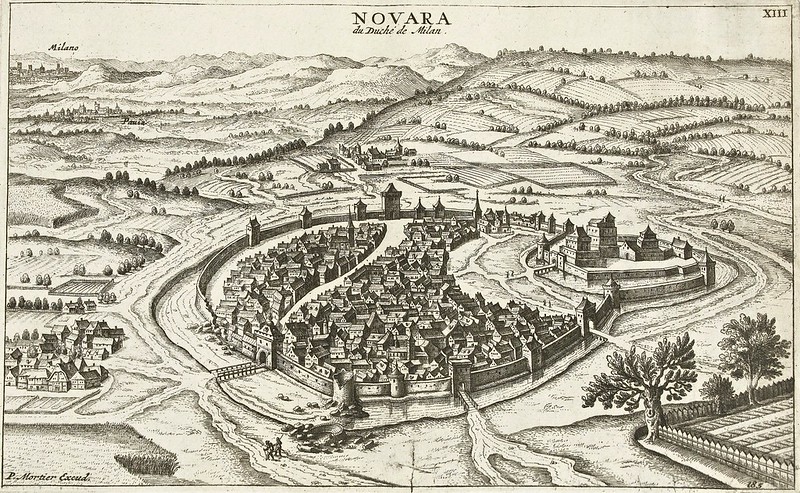Pietro Generali (1773-1832)
- Domine ad adjuvandu a tre soli (c.1805)
Performers: Solists from Coro della Radiotelevisione Ceka; Orchestra Sinfonica di Praga; Eduardo Brizio
Drawing: Anoniem - Gezicht op Novara (c.1702)
Further info: Musica Sacra Inedita - Pietro Generali
---
Italian composer. His surname was Mercandetti until his father changed
it when, bankrupt, the family moved to Rome. There Generali studied
counterpoint with Giovanni Masi, interrupted by four months spent at the
Conservatorio di S Pietro a Majella at Naples. He graduated from the
Congregazione di S Cecilia in Rome and began his career as a composer of
sacred music, producing his first opera only in 1800 (Gli amanti
ridicoli). His first great success was Pamela nubile, composed for
Venice in 1804 and repeated in Vienna in 1805. This was followed by
other comic operas and farces which were widely performed in Italy and
abroad (Le lagrime d’una vedova, Adelina, La Cecchina, La vedova
delirante, Chi non risica non rosica, La contessa di Colle Erboso). He
did not attempt opere serie until 1812 with Attila, but thereafter
produced a considerable number; one of the most successful was I
baccanali di Roma (1816), which was in demand for many years. In spring
1817, when his popularity began to be obscured by Rossini’s successes,
he went to Barcelona as director of the opera company at the Teatro de
la S Cruz. He held the position for about three years, often travelling
in Italy and abroad, and contributed one original work (Gusmano de
Valhor, 1817) and some revivals. From late 1820 to 1823 he was in
Naples, composing several operas and teaching; Luigi Ricci was among his
pupils. With the Naples period his activity as an opera composer came
virtually to an end. In 1823 he became music director of the Teatro
Carolino in Palermo. In spring 1825 he was replaced by Donizetti; he
returned to his post the following season, but in 1826 he was charged
with being maestro venerabile of a masonic lodge and expelled from the
kingdom. In poor health and disappointed by the cold reception of his
works, he returned to the north of Italy and in 1827 became maestro di
cappella at Novara Cathedral, a position he held until his death. In his
last years he had a few opere serie performed, without much success.
Generali composed at least 55 operas as well as sacred works and
cantatas. Contemporaries had conflicting opinions of his work. His early
comic operas sounded ‘moderne’ and even ‘stravaganti’ in their vigorous
and brilliant orchestration and a certain unusual harmonic richness.
But at the end of his career, like many composers of the same
generation, he appeared a pale imitator of Rossini. In 1828 Tommaso
Locatelli wrote of Francesca da Rimini: ‘There prevails a certain
carelessness, a certain triviality of style, as if the maestro had been
working almost per otium’ (Gazzetta di Venezia). In fact, in spite of
their fine melodic qualities and effective delineation of character, his
works sometimes lack substance and structural coherence and do not
always escape a certain stylistic standardization, partly the result of
completing many operas during rehearsals. His use of dramatic orchestral
effects (including the crescendo) anticipates Rossini, but the
attribution to Generali of the invention of the orchestral crescendo, as
stated on his commemorative tablet in Novara and repeated by Pacini in
his memoirs, would seem to be an exaggeration.

Cap comentari:
Publica un comentari a l'entrada